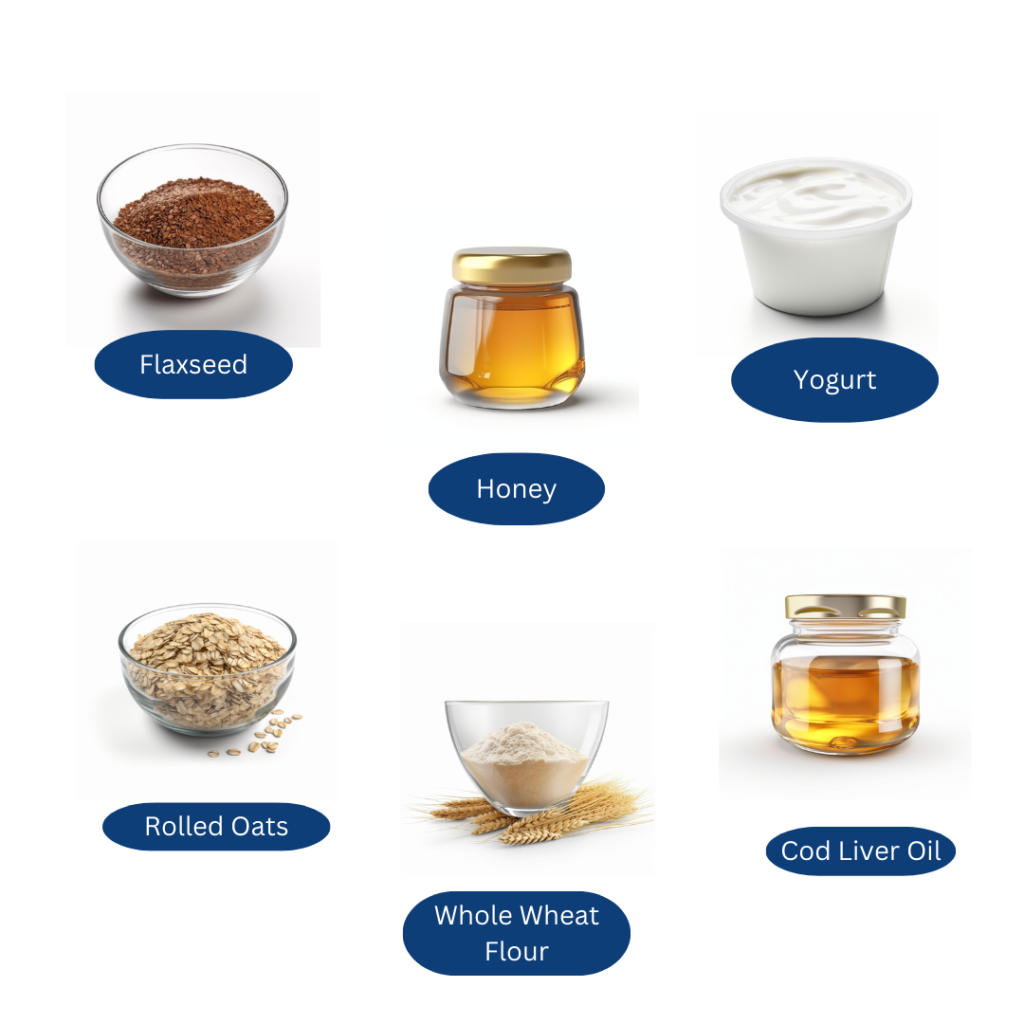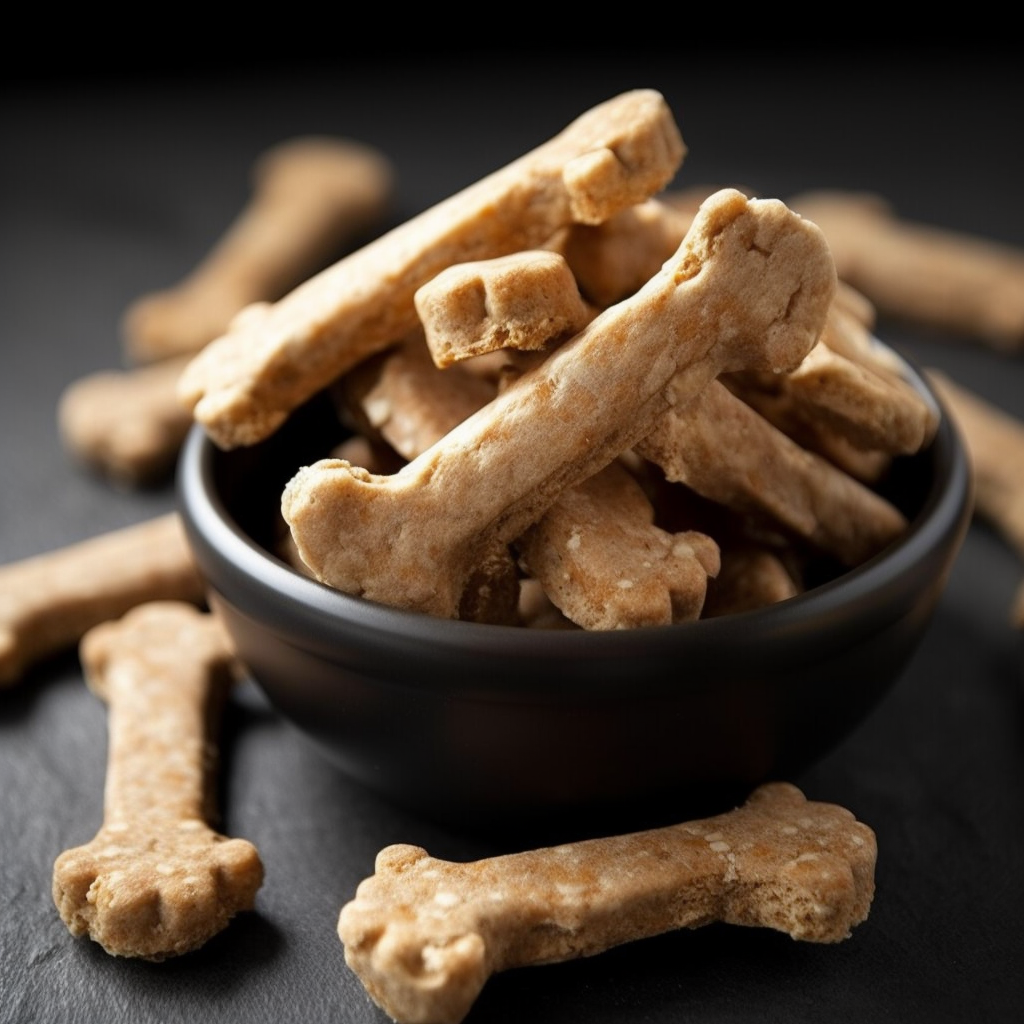These homemade dog treats are a delightful blend of wholesome ingredients, combining the goodness of yogurt and the nourishing properties of cod oil. Each treat is a small, bone-shaped delight, perfectly baked to a golden brown, with a crisp exterior and a tender, chewy center.
The aroma that wafts from these treats is inviting and comforting, reminiscent of freshly baked goods from a loving kitchen but the best thing is how healthy they are. With only 6 healthy ingredients, Yogurt, Cod Liver Oil, Honey, Whole Wheat Flour, Rolled Oats, and Flaxseed this recipe is super easy to make, tastes better, and provides better nutrients than the treats you can find in the grocery store. Let’s take a look at the nutritional benefits of each ingredient.
What You Need:

Ingredient Nutritional Information:
NOTE: As always, it’s a good idea to consult with your veterinarian before introducing any new foods to your dog’s diet, especially if your dog has specific dietary needs or health conditions.
Yogurt:
Unsweetened yogurt can be a beneficial addition to a dog’s diet for several reasons:
Probiotics: Yogurt contains beneficial bacteria known as probiotics, such as Lactobacillus acidophilus and Bifidobacterium, which can help promote healthy gut flora in dogs. These probiotics support digestion and can improve the overall health of the gastrointestinal system.
Digestive Health: The live and active cultures present in unsweetened yogurt can aid in digestion and nutrient absorption. They can help regulate the balance of bacteria in the gut, which is important for proper digestion and the prevention of gastrointestinal issues, such as diarrhea or constipation.
Calcium and Protein: Yogurt is a good source of calcium, which is essential for bone health and muscle function in dogs. It also contains protein, which is necessary for tissue repair, growth, and overall body function.
Cooling and Soothing: On hot days or when a dog is experiencing digestive upset, a small amount of unsweetened yogurt can provide a cooling and soothing effect. It can help alleviate discomfort and provide relief.
When offering yogurt to your dog, it is important to ensure that it is plain and unsweetened. Many flavored yogurts contain added sugars, artificial sweeteners, or other additives that can be harmful to dogs. It’s best to avoid yogurts with added fruits, flavors, or sweeteners, as these can potentially upset a dog’s stomach or contribute to weight gain.
Cod Liver Oil:
Cod liver oil is often recommended for dogs due to its numerous health benefits. Here are a few reasons why cod liver oil can be beneficial for dogs:
Omega-3 Fatty Acids: Cod liver oil is rich in omega-3 fatty acids, specifically eicosapentaenoic acid (EPA) and docosahexaenoic acid (DHA). These fatty acids are essential for a dog’s overall health, supporting their immune system, promoting a healthy coat and skin, reducing inflammation, and supporting brain and eye health.
Joint Health: The omega-3 fatty acids found in cod liver oil have anti-inflammatory properties that can help reduce joint inflammation and improve mobility in dogs with arthritis or other joint issues.
Heart Health: The EPA and DHA in cod liver oil are known to support cardiovascular health by reducing blood clot formation, promoting healthy blood pressure levels, and reducing triglyceride levels.
Skin and Coat Health: Cod liver oil can improve the condition of a dog’s skin and coat, reducing dryness, itchiness, and flakiness. It can also help reduce excessive shedding and promote a shiny, healthy coat.
Vitamin A and D: Cod liver oil is a natural source of vitamins A and D. Vitamin A is essential for vision, immune function, and healthy skin, while vitamin D plays a crucial role in calcium absorption, bone health, and immune function.
When adding cod liver oil to your dog’s diet, it’s important to follow recommended dosages and consult with your veterinarian. Some dogs may have specific health conditions or dietary restrictions that require individualized advice. Additionally, it’s important to choose a high-quality cod liver oil that is specifically formulated for dogs, as some human supplements may contain ingredients that are harmful to dogs. Click here for the cod liver oil we recommend.
Honey:
Honey can provide several potential health benefits for dogs when given in moderation:
Natural Energy Source: Honey is a natural source of carbohydrates and sugars, which can provide a quick and easily digestible energy boost for dogs. It can be especially beneficial for active or working dogs who require an extra energy boost during intense physical activities.
Soothing for Coughs and Sore Throats: Honey has natural soothing properties that can help alleviate coughs and sore throats in dogs. It can provide temporary relief by coating the throat and reducing irritation.
Wound Healing: Honey has been used for centuries as a natural remedy for wound healing. It has antibacterial properties and can create a protective barrier that helps prevent infection and promotes the healing process in minor wounds or skin irritations. However, it’s important to note that honey should not be applied to open wounds without veterinary guidance.
Antioxidant Properties: Honey contains antioxidants that can help neutralize harmful free radicals in the body, potentially contributing to overall health and reducing the risk of certain diseases.
While honey can offer benefits, it’s essential to keep the following points in mind:
Moderation: Honey should be given to dogs in moderation due to its high sugar content. Excessive consumption can lead to weight gain, digestive upset, or other health issues. Small amounts as an occasional treat are generally safe.
Quality and Source: Ensure you are using pure, high-quality honey without any additives or artificial sweeteners. Raw, unprocessed honey is often considered a better choice as it retains more of its natural beneficial properties. Click here to see our recommended honey.
Remember that each dog is unique, and some dogs may have sensitivities or allergies to honey. It’s important to monitor your dog’s response when introducing any new food or ingredient into their diet and make adjustments accordingly.

Whole Wheat Flour:
Whole wheat flour can be a beneficial ingredient when used appropriately in dog treats or homemade dog food recipes. Here are a few reasons why whole wheat flour can be good for dogs:
Nutritional Value: Whole wheat flour contains more nutrients compared to refined white flour. It is a source of dietary fiber, protein, vitamins, and minerals like iron and magnesium. These nutrients can contribute to a balanced diet for dogs.
Digestive Health: The fiber content in whole wheat flour can aid in maintaining regular bowel movements and promote a healthy digestive system in dogs. Adequate fiber intake can help prevent constipation and improve overall gut health.
Sustained Energy: Whole wheat flour is a complex carbohydrate that provides sustained energy for dogs. It releases glucose into the bloodstream at a slower rate compared to simple carbohydrates, helping to maintain stable blood sugar levels.
Weight Management: Due to its higher fiber content, whole wheat flour can help dogs feel fuller for longer, potentially supporting healthy weight management by reducing excessive hunger or overeating.
However, it’s important to note that not all dogs tolerate whole wheat flour well. Some dogs may have sensitivities or allergies to wheat or gluten, which can cause digestive issues or allergic reactions. If your dog has known grain sensitivities or if you suspect an adverse reaction, it may be necessary to explore alternative flours such as coconut flour, almond flour, or grain-free options.
As with any ingredient, it’s best to introduce whole wheat flour gradually into your dog’s diet and observe how your dog responds. If you have concerns or specific dietary considerations for your dog, it’s always recommended to consult with a veterinarian or a veterinary nutritionist for personalized advice.
Rolled Oats:
Rolled oats can provide several health benefits for dogs when included in their diet. Here’s why rolled oats are considered good for dogs:
Digestive Health: Rolled oats are a great source of dietary fiber, which can aid in maintaining healthy digestion for dogs. The fiber content helps regulate bowel movements, prevent constipation, and promote a healthy gut environment.
Nutritional Content: Rolled oats contain essential nutrients such as vitamins (including vitamin B), minerals (such as iron, manganese, and zinc), and antioxidants. These nutrients contribute to overall health and support various bodily functions in dogs.
Energy and Satiety: Rolled oats are a good source of complex carbohydrates that provide dogs with sustained energy. They release glucose into the bloodstream gradually, preventing spikes in blood sugar levels. The fiber in oats also helps dogs feel full and satisfied, which can support healthy weight management.
Coat and Skin Health: The healthy fats present in rolled oats, such as omega-6 fatty acids, can help improve the condition of a dog’s skin and coat. They contribute to a shiny coat and can reduce dryness and itchiness.
Allergen-Friendly Option: Rolled oats are naturally gluten-free, making them a suitable option for dogs with gluten sensitivities or allergies.
When feeding rolled oats to your dog, it’s important to cook or soak them before serving to ensure they are properly digested. Raw oats can be challenging for dogs to break down and may lead to digestive upset. You can cook the oats in water or broth until they are soft and easily chewable for your dog.
Flaxseed:
Flaxseed, also known as linseed, can provide several health benefits for dogs when incorporated into their diet:
Omega-3 Fatty Acids: Flaxseed is one of the richest plant-based sources of alpha-linolenic acid (ALA), an essential omega-3 fatty acid. Omega-3 fatty acids play a crucial role in promoting a healthy coat and skin, reducing inflammation, supporting brain function, and aiding in cardiovascular health.
Fiber: Flaxseed is a good source of dietary fiber, which can help regulate digestion and promote healthy bowel movements in dogs. Adequate fiber intake can assist in maintaining proper weight and reducing the risk of constipation.
Lignans: Flaxseed contains lignans, which are plant compounds with antioxidant properties. Lignans have been associated with potential benefits for hormone balance, immune function, and cancer prevention.
Joint Health: The anti-inflammatory properties of omega-3 fatty acids found in flaxseed can help alleviate joint inflammation and provide relief for dogs with arthritis or joint conditions.
Skin and Coat Health: Flaxseed’s omega-3 fatty acids can help improve the condition of a dog’s skin and coat, reducing dryness, itchiness, and flakiness. It can also promote a healthy, shiny coat.
When feeding flaxseed to your dog, it’s important to grind the seeds or use pre-ground flaxseed to make its nutrients more accessible for absorption. Whole flaxseeds can pass through the digestive system undigested and provide little nutritional benefit. Click here for the kind of flaxseed we use.

Estimated Nutritional Data per Dog Treat (assuming yield of 20 treats):
Calories: Approximately 35-40 calories per treat
Macronutrients:
Protein: Approximately 1-2 grams
Fat: Approximately 1-2 grams
Carbohydrates: Approximately 4-5 grams
Fiber: Approximately 1 gram
Micronutrients:
Calcium: Approximately 10-15 mg
Iron: Approximately 0.3-0.5 mg
Magnesium: Approximately 10-15 mg
Zinc: Approximately 0.2-0.3 mg
Please note that these values are estimates and can vary based on specific ingredients and preparation methods. It’s always a good idea to consult with a veterinarian or a veterinary nutritionist for accurate and personalized nutritional advice for your dog, especially if your dog has specific dietary requirements or health conditions.
Recipe
Ingredients:
1 cup plain, unsweetened yogurt
2 tablespoons cod liver oil
1 tablespoon honey (optional)
1 cup whole wheat flour
1/2 cup rolled oats
1/4 cup ground flaxseed
Instructions:
Preheat your oven to 350°F (175°C) and line a baking sheet with parchment paper.
In a mixing bowl, combine the plain yogurt, cod liver oil, and honey (if using). Mix well until the ingredients are thoroughly combined.
In a separate bowl, whisk together the whole wheat flour, rolled oats, and ground flaxseed.
Gradually add the dry ingredients to the yogurt mixture, stirring well after each addition, until you have a thick, slightly sticky dough.
Lightly flour a clean surface and roll out the dough to about 1/4 inch thickness. You can sprinkle a little extra flour on top of the dough to prevent sticking if needed.
Use a cookie cutter or a knife to cut out shapes from the dough. You can choose shapes that your dog enjoys, such as bones or hearts.
Transfer the cut-out shapes onto the prepared baking sheet, leaving a little space between each treat.
Bake in the preheated oven for approximately 15-20 minutes, or until the treats turn golden brown and crisp. Keep an eye on them to prevent burning.
Once baked, remove the treats from the oven and let them cool completely on a wire rack.
Store the treats in an airtight container in the refrigerator for up to two weeks, or you can freeze them for longer shelf life.
Next Step:
Watch your dog wag that tail feverishly when you offer up one of these yummy and healthy dog treats!!!
The Life of Charlie
“Grant me the serenity to accept the things I cannot change, courage to change the things I can, and the wisdom to know the difference!”



